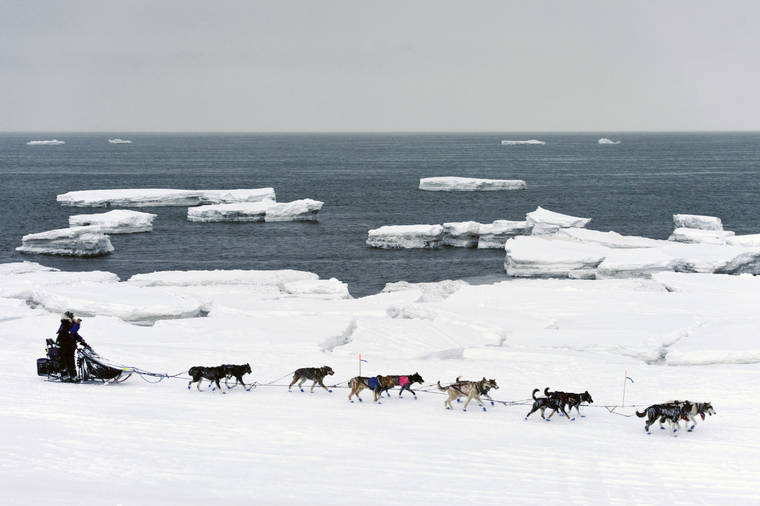ANCHORAGE, Alaska — As the new head of the Iditarod Trail Sled Dog Race, Rob Urbach will have to overcome dwindling sponsorships, dog deaths, a recent dog-doping scandal and animal rights protests.
With all that drama, it seems fitting Urbach, 57, became hooked on the sport thanks to soap opera actress Susan Lucci.
Lucci, who starred on the daytime series “All My Children,” and Urbach struck up a conversation on a 1999 flight to Anchorage, where she was participating in the Iditarod’s ceremonial start and he was going skiing.
He admits he didn’t know who she was but figured out she must have been an actress even though she was more of an ambassador for the Iditarod. She had won one of the auctions that year to be an Iditarider, or the person who sits in the sled as mushers drive the dog teams on a leisurely 11-mile run through Anchorage trails during race’s ceremonial start. The real race starts the following day north of Anchorage.
“Just on the flight out, I sort of got turned on to the Iditarod from that conversation,” he said.
The Colorado resident acknowledged the challenges for the Iditarod, but he said he has faced significant tests in his previous roles, including as CEO of USA Triathlon and before that, as an executive with a sports management and marketing company. He is currently working at a private equity firm and will officially begin his new duties later this month, replacing Stan Hooley, who left the organization in January.
“If the Iditarod was without these real challenges, then they may not need someone with my skill set,” he said Monday, two days after meeting mushers and fans at the Iditarod’s annual picnic in Wasilla, Alaska.
“I have dealt with some pretty significant issues in the sports world,” Urbach said. “The need to counteract those challenges at this time are fairly crucial. So given that, it’s an opportunity to not only put out some fires but change the trajectory of the event, the culture … the brand, to future-proof it for the next 50 years.”
Animal rights activists decry the race, saying it’s cruel to make dogs run about a thousand miles across the Alaska wilderness in less than two weeks. The race’s biggest critic is People for the Ethical Treatment of Animals, which claims more than 150 dogs have died since the race begin in 1973. PETA has taken credit for getting Lower 48 companies to drop sponsorships, which has led to smaller payouts to the mushers.
While previous race officials chose to ignore PETA, Urbach says he’s willing to meet with the group.
He can understand why PETA has been effective with outsiders who are just looking at their accusations and materials. What is not being told, he said, is that those in the mushing community are leaders in animal welfare and dog care.
“And that’s a narrative that PETA and others fail to recognize,” he said.
While he said he’s happy to have an open dialogue with PETA, he said he is hopeful they can be objective. “We’ll be hearing both sides of the story,” Urbach said.
“So, is this is the equivalent of the U.S. and North Korea shaking hands in the DMZ? Maybe, but there’s some work to do there certainly,” he said.
PETA executive vice president Tracy Reiman wrote a letter to Urbach Monday, asking him to pull dogs from the yearly race.
“Will you please use the experience that you acquired while running the USA Triathlon to turn the Iditarod into an athletic event that truly showcases human talent by replacing dogs with willing cyclists, cross-country skiers, or even snowmobilers?’ Reiman wrote.
Forcing dogs to pull a sled until they drop from exhaustion or die “is not a true endurance race. It’s animal abuse,” Reiman wrote.
Race officials have disputed PETA’s total number of deaths, saying no records of dog deaths were kept in the Iditarod’s early years. They have not provided their count of dog deaths to The Associated Press despite numerous requests.
Urbach plans to meet as many mushers as possible at their kennels, a process he said started this weekend.
He is aware there have been rules changes that have upset mushers in the past, but the only side he will take in any dispute will be the Iditarod.
“Whatever changes and decisions are made, they’ll be made in the best interest of the Iditarod itself, the race and future of the race,” he said, adding he was not speaking for the board.
“What’s right for the future growth, impact and in general, brand equity of the Iditarod, and that will be my guiding post,” Urbach said.




